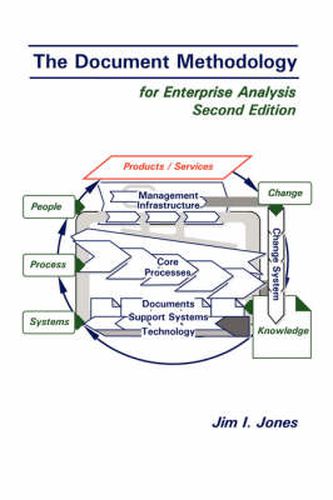Readings Newsletter
Become a Readings Member to make your shopping experience even easier.
Sign in or sign up for free!
You’re not far away from qualifying for FREE standard shipping within Australia
You’ve qualified for FREE standard shipping within Australia
The cart is loading…






This title is printed to order. This book may have been self-published. If so, we cannot guarantee the quality of the content. In the main most books will have gone through the editing process however some may not. We therefore suggest that you be aware of this before ordering this book. If in doubt check either the author or publisher’s details as we are unable to accept any returns unless they are faulty. Please contact us if you have any questions.
The Document Methodology is written for anyone who is trying to manage, operate, understand or change a relatively complex set of business processes supported by an information system on a computer network. The Document Methodology embodies five axioms that form the basis for its approach. The sequence of the axioms reflects the sequence of the book, with each axiom discussed individually in Chapters 2 to 6. The axioms are: 1. Documents record enterprise knowledge. Knowing what support cycles were used to record and access knowledge in what documents provides a base to create more value. 2. Documents define the enterprise process. Defining projects with document milestones of core processes provides a foundation for monitoring and compiling statistics on enterprise performance. 3. Documents provide facts to manage people. The summary of process and resource statistics can be used by the management infrastructure to operate and change its core processes. 4. Documents structure support systems. Requirements for exceptional access to knowledge and for computation of process statistics frame an enabling technology architecture. 5. Documents guide enterprise change. Using variance to understand process and relieve bottlenecks provides the facts to simulate, plan and deploy innovative change.
$9.00 standard shipping within Australia
FREE standard shipping within Australia for orders over $100.00
Express & International shipping calculated at checkout
This title is printed to order. This book may have been self-published. If so, we cannot guarantee the quality of the content. In the main most books will have gone through the editing process however some may not. We therefore suggest that you be aware of this before ordering this book. If in doubt check either the author or publisher’s details as we are unable to accept any returns unless they are faulty. Please contact us if you have any questions.
The Document Methodology is written for anyone who is trying to manage, operate, understand or change a relatively complex set of business processes supported by an information system on a computer network. The Document Methodology embodies five axioms that form the basis for its approach. The sequence of the axioms reflects the sequence of the book, with each axiom discussed individually in Chapters 2 to 6. The axioms are: 1. Documents record enterprise knowledge. Knowing what support cycles were used to record and access knowledge in what documents provides a base to create more value. 2. Documents define the enterprise process. Defining projects with document milestones of core processes provides a foundation for monitoring and compiling statistics on enterprise performance. 3. Documents provide facts to manage people. The summary of process and resource statistics can be used by the management infrastructure to operate and change its core processes. 4. Documents structure support systems. Requirements for exceptional access to knowledge and for computation of process statistics frame an enabling technology architecture. 5. Documents guide enterprise change. Using variance to understand process and relieve bottlenecks provides the facts to simulate, plan and deploy innovative change.